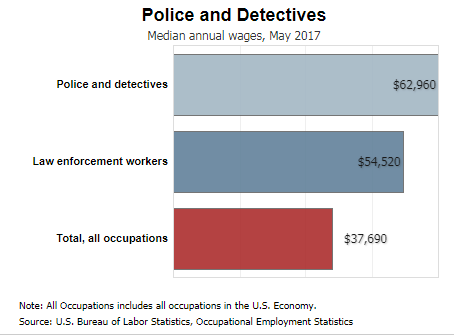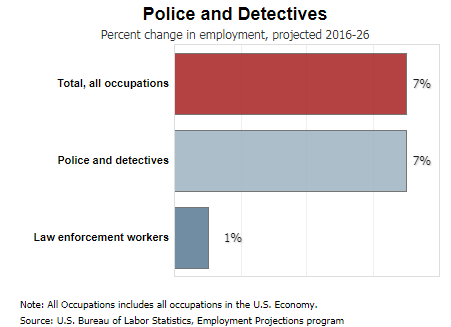Police Officer
Police Officer Information
| Quick Facts: Police Officers | |
| (Amarillo MSA) 2017 Median Pay | $61,850 per year $29.74 per hour |
| Typical Entry-Level Education | high school diploma/GEDor certificate after high school |
| On-the-job Training | Moderate-term on-the-job training |
| (US) Number of Jobs, 2016 | 807,000 |
| (US) Job Outlook, 2016-26 | 7% (As fast as average) |
| (US) Employment Change, 2016-26 | 53,400 |
What Police and Detectives Do
Police officers protect lives and property. Detectives and criminal investigators, who are sometimes called agents or special agents, gather facts and collect evidence of possible crimes.
Work Environment
Police and detective work can be physically demanding, stressful, and dangerous. Police officers have one of the highest rates of injuries and illnesses of all occupations. Working around the clock in shifts is common.
How to Become a Police Officer or Detective
Education requirements range from a high school diploma to a college degree. Most police and detectives must graduate from their agency’s training academy before completing a period of on-the-job training. Candidates must be U.S. citizens, usually at least 21 years old, and able to meet rigorous physical and personal qualifications.
Pay
The median annual wage for police and detectives is $61,850 per year.
Job Outlook
Employment of police and detectives is projected to grow 7 percent from 2016 to 2026, about as fast as the average for all occupations. The continued need for public safety is expected to lead to new openings for officers, although demand may vary by location.

Police officers protect lives and property. Detectives and criminal investigators, who are sometimes called agents or special agents, gather facts and collect evidence of possible crimes.
Duties
Police officers, detectives, and criminal investigators typically do the following:
- Respond to emergency and nonemergency calls
- Patrol assigned areas
- Conduct traffic stops and issue citations
- Search for vehicle records and warrants using computers in the field
- Obtain warrants and arrest suspects
- Collect and secure evidence from crime scenes
- Observe the activities of suspects
- Write detailed reports and fill out forms
- Prepare cases and testify in court
Job duties differ by employer and function, but all police and detectives write reports and keep detailed records that will be needed if they testify in court. Most carry law enforcement tools, such as radios, handcuffs, and guns.
The following are examples of types of police and detectives:
Detectives and criminal investigators are uniformed or plainclothes investigators who gather facts and collect evidence for criminal cases. They conduct interviews, examine records, observe the activities of suspects, and participate in raids and arrests. Detectives usually specialize in investigating one type of crime, such as homicide or fraud. Detectives are typically assigned cases on a rotating basis and work on them until an arrest and trial are completed or until the case is dropped.
Fish and game wardens enforce fishing, hunting, and boating laws. They patrol fishing and hunting areas, conduct search and rescue operations, investigate complaints and accidents, and educate the public about laws pertaining to the outdoors. Federal fish and game wardens are often referred to as Federal Wildlife Officers.
Police and sheriff’s patrol officers are the most common type of police and detectives, and have general law enforcement duties. They wear uniforms that allow the public to easily recognize them as police officers. They have regular patrols and also respond to emergency and nonemergency calls. During patrols, officers look for signs of criminal activity and may conduct searches and arrest suspected criminals.
Some police officers work only on a specific type of crime, such as narcotics. Officers, especially those working in large departments, may work in special units, such as horseback, motorcycle, canine corps, and special weapons and tactics (SWAT). Typically, officers must work as patrol officers for a certain number of years before they may be appointed to a special unit.
Transit and railroad police patrol railroad yards and transit stations. They protect property, employees, and passengers from crimes such as thefts and robberies. They remove trespassers from railroad and transit properties and check IDs of people who try to enter secure areas.

| Police and sheriff’s patrol officers | 684,200 |
| Detectives and criminal investigators | 110,900 |
| Fish and game wardens | 7,000 |
| Transit and railroad police | 4,900 |
The largest employers of police and detectives were as follows:
| Local government, excluding education and hospitals | 78% |
| State government, excluding education and hospitals | 11 |
| Federal government | 7 |
| Educational services; state, local, and private | 3 |
Police and detective work can be physically demanding, stressful, and dangerous. Officers must be alert and ready to react throughout their entire shift. Officers regularly work at crime and accident scenes and encounter suffering and the results of violence. Although a career in law enforcement may be stressful, many officers find it rewarding to help members of their communities.
Some federal agencies, such as the Federal Bureau of Investigation and U.S. Secret Service, require extensive travel, often on short notice. These agents may relocate a number of times over the course of their careers. Some special agents, such as U.S. Border Patrol agents, may work outdoors in rugged terrain and in all kinds of weather.
Injuries and Illnesses
Police and sheriff’s patrol officers have one of the highest rates of injuries and illnesses of all occupations. They may face physical injuries during conflicts with criminals and other high-risk situations.
Work Schedules
Police and detectives usually work full time. Paid overtime is common, and shift work is necessary because the public must be protected at all times.

Education
Police and detective applicants must have at least a high school diploma or equivalent, although many federal agencies and some police departments require some college coursework or a college degree. Many community colleges, 4-year colleges, and universities offer programs in law enforcement and criminal justice. Knowledge of a foreign language is an asset in many federal agencies and geographical regions.
Fish and game wardens typically need a bachelor’s degree; desirable fields of study include wildlife science, biology, or natural resources management.
Federal agencies such as the Federal Bureau of Investigation also typically require prospective detectives and investigators to have a bachelor's degree.
Many applicants for entry-level police jobs have taken some college classes, and a significant number are college graduates.
Training
Candidates for appointment usually attend a training academy before becoming an officer. Training includes classroom instruction in state and local laws and constitutional law, civil rights, and police ethics. Recruits also receive training and supervised experience in areas such as patrol, traffic control, firearm use, self-defense, first aid, and emergency response.
Federal law enforcement agents undergo extensive training, usually at the U.S. Marine Corps base in Quantico, Virginia, or at a Federal Law Enforcement Training Center.
Work Experience in a Related Occupation
Detectives normally begin their careers as police officers before being promoted to detective.
FBI special agent applicants typically must have at least 3 years of professional work experience in areas ranging from computer science to accounting.
Other Experience
Some police departments have cadet programs for people interested in a career in law enforcement who do not yet meet age requirements for becoming an officer. These cadets do clerical work and attend classes until they reach the minimum age requirement and can apply for a position with the regular force. Military or police experience may be considered beneficial for potential cadets.
Cadet candidates must be U.S. citizens, usually be at least 21 years old, have a driver’s license, and meet specific physical qualifications. Applicants may have to pass physical exams of vision, hearing, strength, and agility, as well as written exams. Previous work or military experience is often seen as a plus. Candidates typically go through a series of interviews and may be asked to take lie detector and drug tests. A felony conviction may disqualify a candidate.
Advancement
Police officers usually become eligible for promotion after a probationary period. Promotions to corporal, sergeant, lieutenant, and captain usually are made according to scores on a written examination and on-the-job performance. In large departments, promotion may enable an officer to become a detective or to specialize in one type of police work, such as working with juveniles.
Important Qualities
Communication skills. Police and detectives must be able to speak with people when gathering facts about a crime and to express details about a given incident in writing.
Empathy. Police officers need to understand the perspectives of a wide variety of people in their jurisdiction and have a willingness to help the public.
Good judgment. Police and detectives must be able to determine the best way to solve a wide array of problems quickly.
Leadership skills. Police officers must be comfortable with being a highly visible member of their community, as the public looks to them for assistance in emergency situations.
Perceptiveness. Officers, detectives, and fish and game wardens must be able to anticipate a person’s reactions and understand why people act a certain way.
Physical stamina. Officers and detectives must be in good physical shape, both to pass required tests for entry into the field, and to keep up with the daily rigors of the job.
Physical strength. Police officers must be strong enough to physically apprehend offenders.

The median annual wage for police in the Texas Panhandle is $61,850. The median wage is the wage at which half the workers in an occupation earned more than that amount and half earned less. The lowest 10 percent earned less than $43,670, and the highest 10 percent earned more than $82,200.
Median annual wages for police and detectives in May 2017 were as follows:
| Detectives and criminal investigators | $79,970 |
| Transit and railroad police | 70,280 |
| Police and sheriff’s patrol officers | 61,850 |
| Fish and game wardens | 56,410 |
In May 2017, the median annual wages for police and detectives in the top industries in which they worked were as follows:
| Federal government | $84,660 |
| State government, excluding education and hospitals | 65,880 |
| Local government, excluding education and hospitals | 61,340 |
| Educational services; state, local, and private | 52,080 |
Uniformed officers, detectives, agents, and wardens usually work full time. Paid overtime is common. Shift work is necessary because the public must be protected at all times.
Other Compensation and Benefits
Many agencies provide officers with an allowance for uniforms, as well as extensive benefits and the option to retire at an age that is younger than the typical retirement age. Some police departments offer additional pay for bilingual officers or those with college degrees.
Union Membership
Most police and detectives belonged to a union in 2016.

Employment of police and detectives is projected to grow 7 percent from 2016 to 2026, about as fast as the average for all occupations.
While a continued desire for public safety is expected to result in a need for more officers, demand for employment is expected to vary depending on location, driven largely by local and state budgets. Even with crime rates falling in recent years, demand for police services to maintain and improve public safety is expected to continue.
Job Prospects
Job applicants may face competition because of relatively low rates of turnover. Applicants with a bachelor's degree and law enforcement or military experience, especially investigative experience, as well as those who speak more than one language, should have the best job opportunities.
Because the level of government spending determines the level of employment for police and detectives, the number of job opportunities can vary from year to year and from place to place.
| Employment projections data for police and detectives, 2016-26 | |||||
| Occupational Title | SOC Code | Employment, 2016 | Projected Employment, 2026 | Change, 2016-26 | |
| Percent | Numeric | ||||
| Police and detectives | — | 807,000 | 860,300 | 7 | 53,400 |
| Detectives and criminal investigators | 33-3021 | 110,900 | 115,900 | 5 | 5,000 |
| Fish and game wardens | 33-3031 | 7,000 | 7,300 | 4 | 300 |
| Police and sheriff’s patrol officers | 33-3051 | 684,200 | 731,900 | 7 | 47,800 |
| Transit and railroad police | 33-3052 | 4,900 | 5,300 | 6 | 300 |
| SOURCE: U.S. Bureau of Labor Statistics, Employment Projections program | |||||
Bureau of Labor Statistics, U.S. Department of Labor, Occupational Outlook Handbook, Police and Detectives, on the Internet at https://www.bls.gov/ooh/protective-service/police-and-detectives.htm (visited September 09, 2018).
Salary information comes from the Bureau of Labor Statistics, Occupational Employment Statistics Program, a semi-annual survey that provides wage and employment statistics for the nation, each state, and sub-state regions.
Tagged as APD, City of Amarillo, Cop, Female Officer, Law Enforcement, Officer Garcia, Patrol, Police, Police Academy, Police Officer, Protective Service Occupations.
Written by Phillip



















